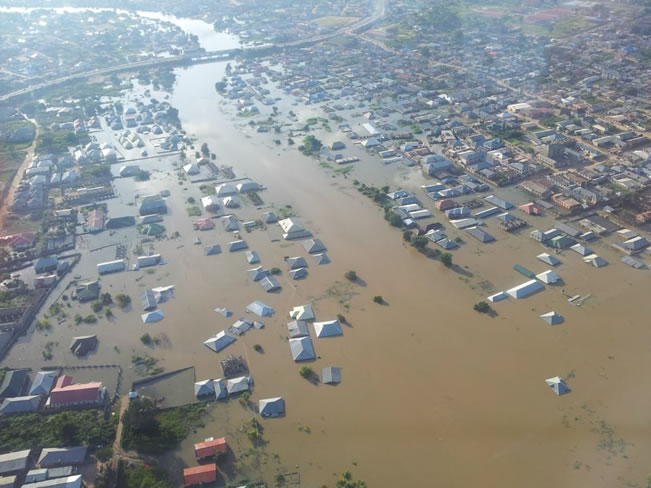Despite the huge housing deficit of over 20 million units in Nigeria, DAYO AYEYEMI reports that the latest flooding in many states has further depleted the nation’s housing stock, thereby widening the accommodation gap among Nigerians.
No fewer than 203,371 housing units have been damaged by flooding ravaging villages, towns, cities and farmlands across Nigeria in the last one month.
According to the Federal Government’s report, the disaster partially damaged 121,318 houses totally damaged 82,053 houses, partially damaged 108,392 hectares of farmlands and totally damaged 332,327 hectares of farmlands, all across Nigeria.
The natural disaster also claimed 603 lives, affected 2,504,095 persons and displaced 1,302,589 persons across the country.
By this damaged houses’ figures, the nation’s housing deficit of over 20 million units, according to the estimates by the United Nations (UN), has further been widened by 203, 371 units, thereby aggravating issue of homelessness among Nigerians.
The number of dwelling units reported to have been damaged by the deluge is not part of the housing units demolished by various government’s agencies during the year for one infraction or the other.
From Kogi State to Anambra, Delta, Cross River, Rivers and Bayelsa states, the impacts of the ravaging flood are enormous as people struggle to move out of their homes to safe locations.
However, as Nigerians continue to lament the impacts of flooding across the country, looking for succor, the Federal Government has warned that the country was not yet out of the wood, disclosing that five states are still at risk of experiencing flooding up to November, this year.
Worried by the destructions, experts in the built environment have expressed concerns over the increasing housing deficit in the country, suggesting ways to combat the perennial flooding, which they claimed was occasioned by the opening of Cameroon’s Dam and climate change/ global warming.
Speaking about the deluge, one of the affordable housing’s advocates in Nigeria, MrKunleFaleti, described flooding as the “number one natural disaster” in most of the states in Nigeria.
“Flooding is a real problem for those individuals living in flood plains and flood damage could be very devastating. Last year, flood devastated a wide area of Lagos (Etiosa/Lekki/Ibeju/Ikorodu/Badagry) and caused approximately N10 billion in damages,” he said.
According to him, he pointed out that flooding issues were being addressed by constructing sea walls, levees and dams (Ogun/Osun River and Majidun).
Despite these efforts, he said they remained temporary measures and would not prevent the force of nature at its worst.
National flood insurance program
To mitigate against loss, the US-based professional, Faleti canvassed the need for the National Flood Insurance Program
According to Faleti, the National Assembly should as a matter of urgency pass a Flood Disaster Protection Act.
The Act, he explained would require buildings located in identified flood hazard areas to have flood insurance coverage as a condition of receiving federal and state aid or loans from federally insured banks for federal disaster assistance.
According to him, Primary Mortgage Institutions and banks must ensure that a flood insurance policy is in place before disbursing on any loan which is secured by a property located in a special flood hazard area (SFHA)
“Flood insurance is a common sense risk-management tool for both lenders and borrowers. The premiums would be a small cost compared to the potential loss from a flood.
“Lenders can, at their discretion, require flood insurance even for property outside of SFHAs.”
“For lenders, It is important to have a quality control review program to verify that borrowers obtain at least the minimum required coverage.
“The review should include checking insurance policies upon receipt from the insurance company/agent to confirm that the policies were written for the correct risk zone noted in the initial flood determination,” he said.
He noted that home owner’s policies usually/generally did not provide flood coverage, saying this was highlighted in bold letters on most home owner’s policies.
“People are just ignorant. A lot of pressure is put on the government when disaster happens. I have been championing this cause since 2008. “Penny wise, Pounds foolish. There is a great misconception that flood policy is expensive,” he said.
Faleti suggested that financial institutions should legally be required to comply with clearly stated requirements related to flood insurance, including:
– The purchase of mandatory flood insurance under a National Flood Policy.
– Lender-placed insurance (LPI) requirements under a Real Estate Settlement Procedures Act
– Flood insurance requirements for Federal Mortgage Bank Nigeria, Nigerian Mortgage Refinance Company, Family Home Funds Limited and all federal mortgage programs.
ALSO READ FROM NIGERIAN TRIBUNE
According to him, failure to comply with relevant requirements should result in examination findings, costly look-backs, enforcement actions, and civil money penalties for violations.
He added that non-compliance should also result in litigation and reputational risk.
“And, of course, there is significant exposure to actual flood losses if a financial institution fails to require legally mandated coverage and flooding occurs.,” he said.
He urged that, stakeholders in the industry should sponsor a research that will examine the link between property damage, flood insurance and mortgage credit risk.
“You can be rest assured they will find out that compared with homes with no damage, loans on moderately to severely damaged homes are more likely to become delinquent after a flood incident,” Faleti said.
Experts’ views
Former President, Nigerian Institute of Town Planners, Mr Steve Onu, blamed flooding in some of the states on man-made actions and inactions.
“Our actions as a result of non-adherence to planning regulations and our development patterns that are anti- planning,” he said.
To make Nigeria’s cities resilient to disasters, he said that all stakeholders must embrace the UN -DRR elements for making cities resilient.
According to him, flooding is a natural disaster which could only be handled through planning measures, describing housing as one of the components of planning.
On flood insurance cover, President, Nigerian Council of Register Insurance Brokers, MrRotimi Edu, a barrister, said there has been a policy in place, adding that the practice has been there for people to insure their house.
“If you insure your house against flood, it is the standard insurance cover,” he said, advising people to take such policy.
He noted that it has become common for people to take fire cover, leaving flood cover out of it
For the ravaging flooding in Kogi State and other parts of the country, he pointed out that people in these areas knew they were sitting within flood plains, suggesting that they needed standard fire cover, which flooding is an extension.
He identified people’s apathy towards insurance as a major challenge in the country, noting that insurance has not been a priority for Nigerians.
Edu described the flooding in Kogi, Bayelsa, Rivers and Anambra States as “National Disaster”, which requires the Federal Government’s assistance.
He advised that since the flooding is due to the opening of Cameron Dam, the Federal government should have built a dam to mitigate the impact.
Mixed reactions
Reacting to Faleti’s postulation on the social platform, Wale Afolabi-brown, described the idea of mandatory flood insurance cover for houses in river-plain locations, “very good idea if it can be implemented.”
In general, he said that flood insurance insurance is cheap for the amount of coverage.
Citing USA example, he said “About $500 a year for $250,000 coverage of your structure. its capped at $250,000 and $100,000 for your contents. Good deal. “If you are in a flood zone no loan for you without flood insurance,” he said.
Another person, AdetoroAkinseye, said he wondered why the flood prone areas are the most exorbitant real estate contrary to what is obtainable in the United Kingdom.
Faleti appealed to the Federal and States’ legislators to make this topmost priority, adding that the insurance companies would need to think outside the box as well and that coming up with a flood insurance product should be pretty easy.
Another person, Peter Osunbade, said it was a good idea if a flood insurance policy is in place, but pointed out that flood prone areas are mainly occupied by people who will never pay insurance for floods that come every decade.
“What Nigeria needs are dams and people to move from flood prone areas. Natural disasters like this days flood is always a headache for policy making, insurance and any preplanned activities,” he said.
He raised a poser concerning mandatory flood insurance for thatched huts, mud bungalows and makeshift accommodation.
“Mandatory insurance for people who make less than a dollar a day? Nigerians peculiarities will need a whole new chapter for flood-related insurance,” he said.
2022 seasonal climate prediction
It would be recalled that on Tuesday, 15th February 2022, the Nigerian Metrological Agency had released the 2022 Seasonal Climate Prediction informing Nigerians that the rains of 2022 will be heavier and longer.
Furthermore, on Thursday, May 12, 2022, the Nigeria Hydrological Services Agency released the Annual Flood Outlook.
Immediately after these two releases, the National Emergency Management Agency was all out, warning of expected floods and advising on mitigating and preparedness actions people need to take to minimise losses and damages.
ALSO READ FROM NIGERIAN TRIBUNE
WATCH TOP VIDEOS FROM NIGERIAN TRIBUNE TV
- Relationship Hangout: Public vs Private Proposals – Which Truly Wins in Love?
- “No” Is a Complete Sentence: Why You Should Stop Feeling Guilty
- Relationship Hangout: Friendship Talk 2025 – How to Be a Good Friend & Big Questions on Friendship
- Police Overpower Armed Robbers in Ibadan After Fierce Struggle






